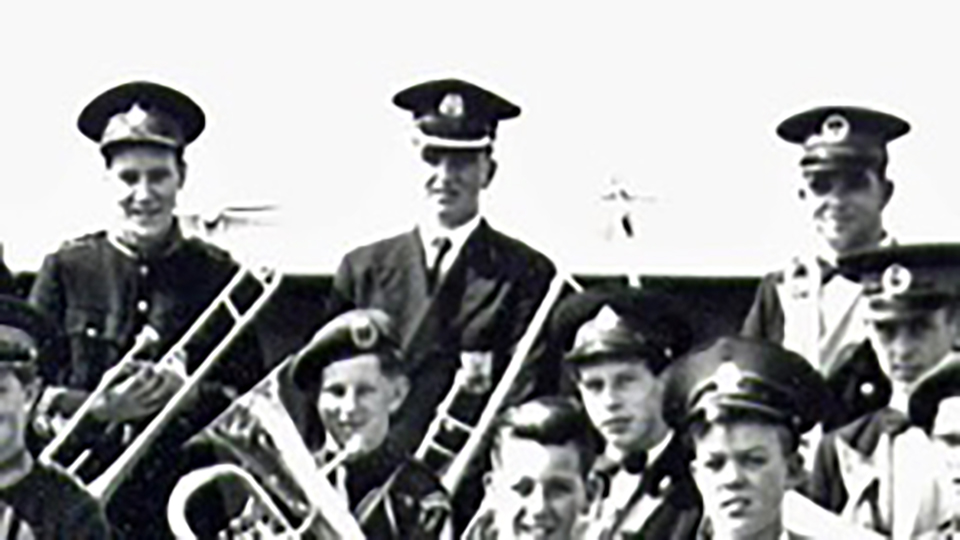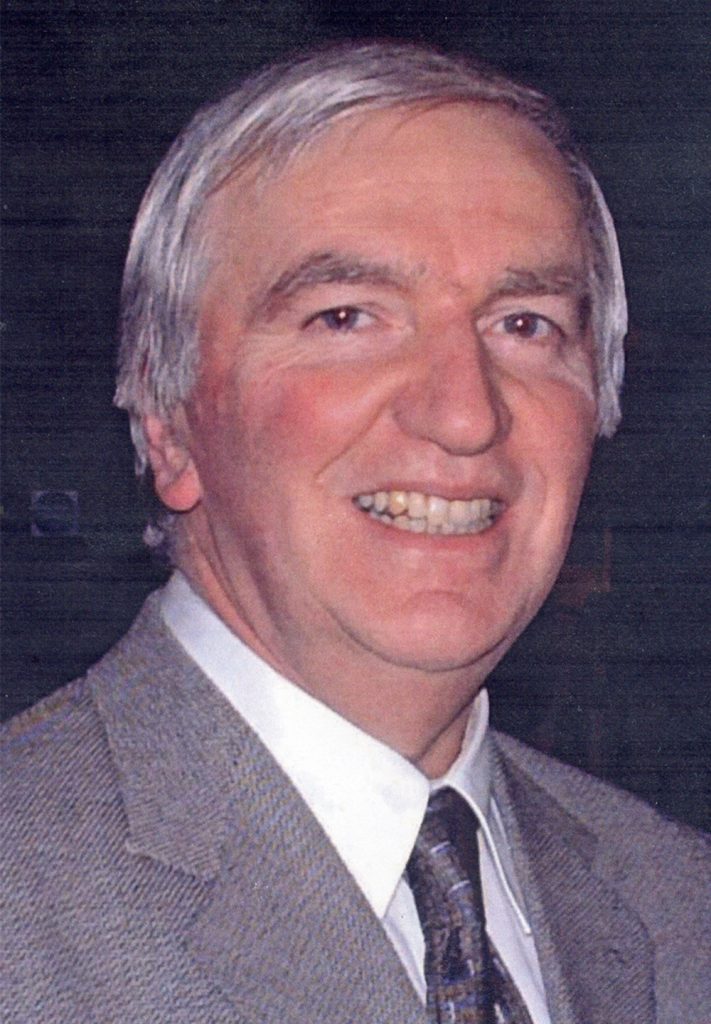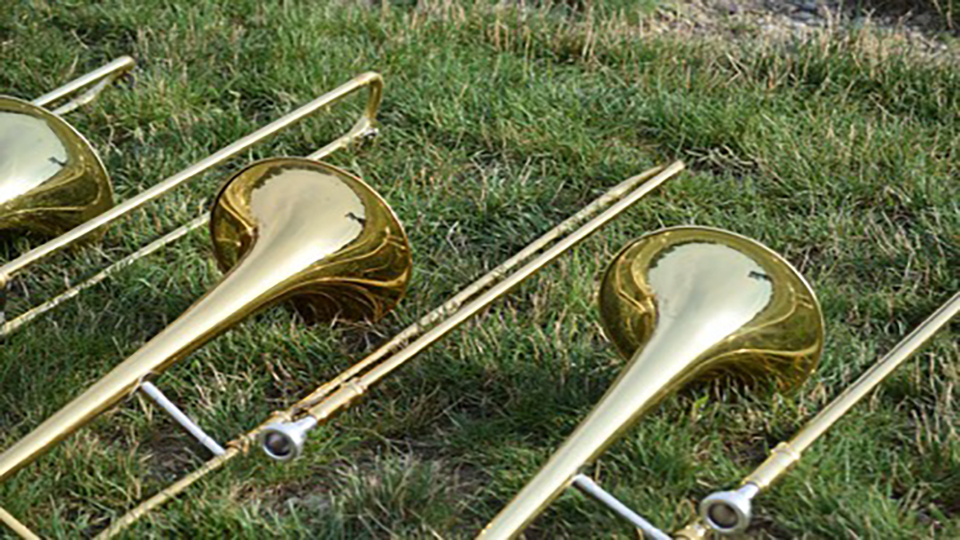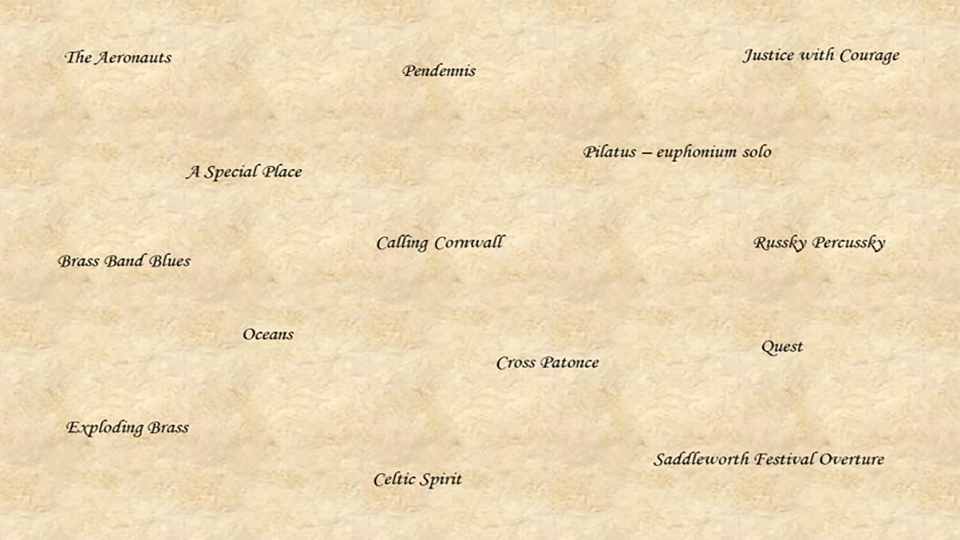
In the latest in our Cornish music series, Philip Hunt brings to life, the story of iconic Cornish musician Goff Richards.
“I think the march has clarity and energy and is a far higher quality than is usually found in brass band music. The scoring is excellent, you obviously have a special gift.” So wrote Malcolm Arnold to a young Godfrey Richards who had had the temerity to send the score of his march ‘Quest’ to the distinguished composer for his opinion. Not only did he reply in such glowing terms but arranged for the march to be published, the first of literally hundreds of works by Godfrey, now known to us as Goff, that have been published and enjoyed over the years by musicians and listeners alike.
Godfrey Richards was born into a musical family on 18th August 1944 in the North Cornwall village of St Minver where he spent his early years. The family had lived in the village for several generations and had always been involved in music in the days when it played a more important part in local life and was one of the few ways of providing entertainment.

Both his parents were practising musicians. His father, William, was a trombone player and later conductor of St Minver Silver Band whilst mother, Charlotte, was the village church organist for forty years. Along with his sister, Joyce, Godfrey was a member of the church choir under the watchful eye of his mother and rumour has it that he would sing out of tune at rehearsals in the hope of being sent out by her to be able to join the other village boys at cricket. One relative who had a great influence on him musically was his uncle, Jack Wills, a well-known brass band arranger himself, to whom Goff dedicated his popular piece, ‘Breezin Down Broadway,’ many years later.
Singing was his first taste of music but long before starting piano lessons around the age of eight he would join Joyce as a drummer as she played piano, the drum in question being a silver cake stand. He first heard a brass band at the age of nine, when he was taken by his father to the Cornish Stadium at St Austell on 14th September 1953, to hear the famous National Band of New Zealand who were visiting Cornwall on their tour of Great Britain. The music included the ‘Grand March from Aida,’ the test piece ‘Coriolanus’ by Cyril Jenkins and ‘Finlandia’ by Sibelius. Many years later he was able to meet up with a member of that 1953 Band on his first visit to New Zealand.
The young Godfrey was bowled over by the sound, so much so that he pestered his father to take a leading role in reforming the St Minver Silver Band so that he could play in a brass band. The Band had been out of action for some years and it took nearly twelve months before it re-formed, in the autumn of 1954 with W A Wills as its Conductor. Trombone lessons followed from Edgar Strout, who later emigrated to New Zealand, whilst at the same time Godfrey taught himself the saxophone which he played in the first of many groups and bands that he formed over the years. As well as himself on Saxophone the group, which played at local dances, included sister Joyce on piano and her future husband Ken Buse on drums. With the group, choir, band and piano, music took up a lot of the family’s time, as Joyce told me, “That was our life when young, we played together all the time and helped each other musically”.

Keen on cricket, a member of the village team and an occasional surfer, Godfrey was, Joyce told me, “A lively brother with a good sense of humour”. It was when he went on to Bodmin Grammar School that the change in Christian name came about. His new friends initially shortened Godfrey to God, which he disliked and came up instead with Goff which quickly became accepted. Although a few of his early published works were still by Godfrey Richards this soon changed to Goff which he used as both his professional and personal name from then on.
Within his wider circle of friends at the Grammar School were several talented musicians and it was not long before Goff formed The Syncopated Six, based on The Temperance Seven, for whom he made his first arrangements. At that time the School had no music teacher but the Headmaster was so impressed with the wealth of musical talent that had suddenly appeared that one was speedily appointed and Goff was able to take an O Level in music amongst the more usual subjects. As well as singing in operas at the School such as, ‘The Bartered Bride’ and ‘Dido and Aeneas,’ he had also talked his way into playing with The Rockets at The Pavilion Ballroom in Rock. This was a group of professional players who lived in the area, who were booked by John Bray, with whom Goff gained valuable experience on several instruments including the clarinet, another instrument he had taught himself to play.
As well as playing trombone with St Minver Band he was an enthusiastic member of The Cornwall Youth Brass Band taking part in their first residential course in 1959 which was held under canvas at Porthpean near St Austell under the baton of Dr Denis Wright.

By now all he wanted to do was to make music and in 1962 was accepted by The Royal College of Music in London for one of only three places available to study trombone. The three years there were followed by working for a teaching diploma at Reading University before he returned to Cornwall to take up the post of Head of Music at Fowey School at the young age of 21. Despite teaching full time the lure of performance was still strong and many evenings were spent every week playing with his group in hotels in Newquay and elsewhere. He also found time to be involved with local brass bands and had spells conducting both St Minver and St Breward Bands.
After four years at Fowey the attraction of playing and the lure of travel proved too strong and Goff gave up teaching to form the Goff Richards Band and went off to play in Kenya as well as appearing on cruise liners. Contact with Cornwall was not lost as, in between engagements, Goff kept up his interest in teaching by acting as a supply teacher at St Austell and Newquay. When, in 1972, he decided to return to full time teaching it was as Head of Music at Newquay School, although the evenings were again filled with gigs with his group and more and more composing and arranging.
At Newquay one of the pupils in his class was Elaine Tangye, now well known in Cornwall as a pianist and choral conductor. Elaine told me Goff was, “An inspiring teacher, who was always there for you, in one word, he was brilliant”. She remembers the School recorded an LP at the time called, ‘Nearly All Our Own Work’ on which she sang a solo with Goff at the piano.
However. such was the acceptance and popularity his music was gaining he decided it was time to move to London to be in the centre of the musical world, so in 1975 teaching was once more left behind. After six months there an offer came, as a result of an audition in Cornwall some while before, to take his group on a contract to the Seychelles playing in the top island hotel. Following this he undertook a lot of freelance work as well as directing the Band at the prestigious Water Splash Hotel in Jersey.
Since his brass band march, ‘Quest,’ had been published with the help of Malcolm Arnold in 1970, Goff had become more and more interested in brass bands and their music and had written several more pieces for them. So when an advertisement caught his eye for someone to lead the first dedicated course in Brass Band Musicianship in the Country at Salford College of Technology he lost no time in applying. Granted an interview he found the only way to get there and back in a day from Jersey, in order to fulfil the evening’s engagement at the Hotel, was to charter a private plane, albeit at the cost of several weeks wages.
Arriving for the interview his heart sank as he found he was in competition with two eminent brass band musicians, Roy Newsome and David Loukes. Having asked if he could be interviewed first, as he had a private plane waiting, he returned to Jersey to hear that Roy Newsome had got the job. However, such was the impression he had made on the College officials that a post was created for him to lecture not only in Brass Band Studies but also in arranging, in Popular Music and to form and run a College Jazz Orchestra. David Loukes who had played the major role in setting up this ground breaking initiative was also appointed to the team, which together went on to make such a success of the course that similar ones have since been set up in many other colleges and universities throughout the Country.
One job was still not enough for this talented musician so the arranging and composing went on apace for all sorts of combinations. During this time Goff had started arranging for the BBC Northern Radio Orchestra. He had taken along to them an arrangement of ‘Windmills of Your Mind’ which they liked and broadcast and which led to an increasing number of commissions from the Orchestra. So much so that after four years at Salford he decided that the time had come to take the plunge and continue entirely as a self employed freelance composer and arranger.
On the very day he handed in his notice at Salford College the BBC announced that it was axing the BBC Northern Radio Orchestra which had provided the bulk of his commissions at that time. Despite this major setback, Goff decided there was no going back, a decision which has since been vindicated by the pre-eminent position he has built up for himself as a leading composer, arranger, conductor and adjudicator in many musical fields.
Over the next two decades he formed at least fifteen different groups such as the Goff Richards Orchestra, Burnished Brass, Percussion Plus, The Beergardeners and The Arcadians for specific purposes and programmes, many on BBC Radio and Television including the Jimmy Young Show. He also wrote works for the Kings Singers, the Swingle Singers, Huddersfield Choral Society, the percussionist Evelyn Glennie and the great Cornish baritone, Benjamin Luxon as well as numerous works for male voice and mixed choirs.
In 1978 he received a commission to write a Championship Test Piece for The West of England Bandsman’s Festival at Bugle. This resulted in ‘The Aeronauts’ which mirrored his fascination for the world of aviation and reflected the dramatic and romantic aspects of flying. It was dedicated to his father, William, and was used again at the Festival in 2007. In 1978 the winning band was St Dennis conducted by Eddie Williams who had been a great influence on Goff and had helped him for some time in trying out his arrangements with the band.
His big breakthrough into world wide success as a composer and arranger for brass bands also came in 1978 with the publication of his arrangement of ‘The Shepherds Song,’ which was based on a popular folk song from the Auvergne region of France. In making an arrangement of it for The Kings Singers Goff had realised its sweet and lilting melody would suit a brass band and it was an immediate hit with bands and audiences alike. Since then the number of pieces for brass bands runs into many hundreds of the around one thousand arrangements and compositions he produced. Brighouse & Rastrick, Fodens, BNFL and St Austell Bands have all issued recordings solely featuring his music and very few brass band CD’s made over the last few years do not contain at least one of his pieces.

As well as this prodigious output Goff also found time, amongst many other musical duties and positions, to become a world wide adjudicator, conductor and teacher visiting countries as far apart as Australia, Switzerland, New Zealand, Japan, Norway and the Faroe Islands to name but a few. He served on the BBC’s Central Music Advisory Committee and was also a member of the British Music Writers’ Council. He kept in touch with music in Cornwall as President of The South West Brass Band Association, Holman Climax Choir and St Breward Silver Band and was Music Advisor to The Cornwall Youth Brass Band.
As an External Examiner for the University of Salford, where he was awarded an Honorary Doctor of Letters Degree in 2002, he directed the Jazz Orchestra at Cheetham’s School of Music in Manchester and regularly arranged the music for the BBC Television programme Songs of Praise. One of his biggest projects was a full length brass band musical set in the 1950s called ‘Juke Box’. This had its premiere and first twenty performances in Lucerne in Switzerland in December 2006.
He was made a Bard of The Cornish Gorsedh at Heyl (Hayle) in 1976, taking the Bardic name of Gwas Mynver, Servant of St Minver. Goff was proud of his Cornish ancestry and brought lustre to the County as one of its most prominent and talented musical sons.
Sadly he died on 25th June 2011, at the early age of 66.
He was advised many years ago, he told me, “…to always keep in touch with young people” and believes this has played a great part in his success along with his deep love of music. This allied with a natural Celtic talent for melody and penchant for hard work kept us entertained for many years and will no doubt continue to do so in the future.
Phillip Hunt. Copyright 2018.
The following recording, ‘Behold the Power of God’ was composed by Christopher Bond and played at the CYBB course concert on 5 April 2010 (the date of the recording).
Christoper said “I wrote this piece for the Cornwall Youth Brass Band and they gave the debut performance in 2010. It was dedicated to Goff Richards, who was in the audience at that premiere performance. The piece’s title ‘Behold the Power of God’ makes reference to his name; with Godfrey translating as God-peace, and Richards translating as powerful.”
Christopher Bond. Copyright 2010.
Music Kernow will continue in next month’s issue when Philip Hunt returns with his piece on the inspirational musician Sir Malcolm Arnold. Follow Cornish Story on Twitter and Facebook to find out more. You can also find the first article in the series here.

Very interesting. I was at Bodmin Grammar school with Goff although I was a couple of years younger-1957-1964. I was very proud to be in the Syncopting Six playing the trombone. I think we also had piano, double bass, sax. Drums and clarinet or may have been trumpet. I also played in the Wadebridge Junior Band and Cornwall County Youth Brass Band. So sad that Goff died at a comparatively early age. Never did meet him again after we both left school. Roger Kingdon
Very interesting. I was at Bodmin Grammar school with Goff although I was a couple of years younger-1957-1964. I was very proud to be in the Syncopting Six playing the trombone. I think we also had piano, double bass, sax. Drums and clarinet or may have trumpet.